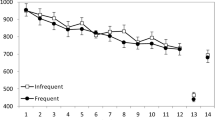Summary
Two experiments look at the combination of explicit and implicit learning processes on a single task. Subjects are required to control the rate of sugar output in a small sugar production factory while maintaining cordial relations with the union. Experiment 1 investigates whether subjects can learn to control this task, which relies on their knowing about both salient and nonsalient relationships. It looks at how performance on the task relates to explicit verbalisable knowledge (as assessed by written questionnaire). Experiment 2 considers alternative ways of tapping the more implicit aspects of subjects' knowledge.
Similar content being viewed by others
References
Barr, A., & Feigenbaum, E. A. (1982). The handbook of artificial intelligence. London: Pitman Books.
Berry, D. C. (1984). Implicit and explicit knowledge in the control of complex systems. Unpublished doctoral dissertation. University of Oxford, U.K.
Berry, D. C., & Broadbent, D. E. (1984). On the relationship between task performance and explicit verbalisable knowledge. Quarterly Journal of Experimental Psychology, 36A, 209–231.
Berry, D. C., & Broadbent, D. E. (In preparation). Interactive tasks and the implicit — explicit distinction.
Hayes-Roth, F., Waterman, D. A., & Lenat, D. B. (1983). Building expert systems. Boston: Addisoh Wesley.
Jacoby, L. L., & Dallas, M. (1981). On the relationship between autobiographical memory and perceptual learning. Journal of Experimental Psychology: General, 110, 306–340.
Reber, A. S. (1976). Implicit learning of synthetic languages: The role of instructional set. Journal of Experimental Psychology: Human Learning and Memory, 2, 88–94.
Reber, A. S., Kassin, S. M., Lewis, S., & Cantor, G. (1980). On the relationship between implicit and explicit modes of learning a complex rule structure. Journal of Experimental Psychology: Human Learning and Memory, 6, 492–502.
Author information
Authors and Affiliations
Rights and permissions
About this article
Cite this article
Berry, D.C., Broadbent, D.E. The combination of explicit and implicit learning processes in task control. Psychol. Res 49, 7–15 (1987). https://doi.org/10.1007/BF00309197
Received:
Issue Date:
DOI: https://doi.org/10.1007/BF00309197




